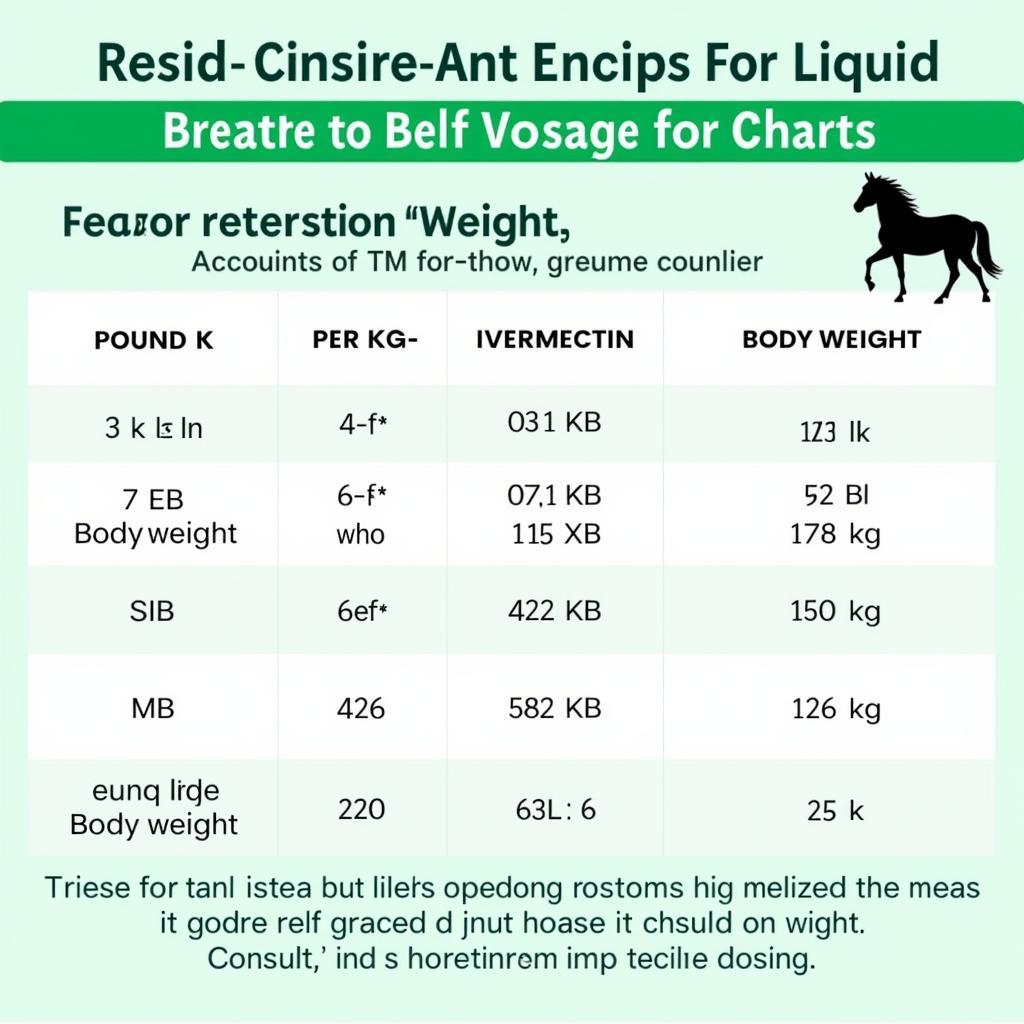Liquid Ivermectin For Horses is a common medication used to treat internal and external parasites. Understanding its uses, dosage, and potential side effects is crucial for responsible horse ownership. Let’s delve into everything you need to know about this essential equine medication.
Understanding Ivermectin and its Uses in Horses
Ivermectin is a broad-spectrum antiparasitic medication effective against a wide range of internal and external parasites in horses. These include roundworms, lungworms, bots, mites, and lice. It works by interfering with the parasite’s nervous system, leading to paralysis and death. Ivermectin comes in various forms, including paste, injectable, and liquid, each with its own advantages and disadvantages. The liquid form offers precise dosing, especially for foals or smaller horses, making it a popular choice for many horse owners. Pelleted wormer for horses is another option, providing convenience for some. You can also consider Strongid wormer for horses, another option with its own set of benefits.
Administering Liquid Ivermectin: Dosage and Precautions
 Ivermectin Dosage Chart for Horses
Ivermectin Dosage Chart for Horses
Accurate dosing is crucial when administering liquid ivermectin. The dosage is typically based on the horse’s weight, and it’s essential to consult with a veterinarian to determine the correct amount for your horse. Underdosing can be ineffective, while overdosing can lead to toxicity. Use a calibrated syringe to ensure precise measurement and avoid any potential errors. Always follow your veterinarian’s instructions carefully, and never exceed the recommended dosage.
Potential Side Effects and Precautions
Although generally safe, ivermectin can cause side effects in some horses. These can include mild symptoms like swelling or itching at the injection site, or more serious issues like neurological problems in cases of overdose. Certain breeds, such as Collies, Shetland Sheepdogs, and Australian Shepherds, are known to be more sensitive to ivermectin and may experience more severe reactions. Inform your veterinarian about any other medications your horse is currently taking to avoid potential drug interactions.
“Accurate dosing is paramount,” says Dr. Emily Carter, DVM, specializing in equine medicine. “Even a slight miscalculation can have significant consequences. Always consult a veterinarian to determine the appropriate dosage for your horse’s specific needs.”
Choosing the Right Ivermectin Formulation
Selecting the appropriate ivermectin formulation depends on various factors, including your horse’s age, weight, and temperament. Liquid ivermectin offers precise dosing and is often preferred for foals and smaller horses. Paste formulations are convenient for single-dose administration, while injectables may be suitable for horses that are difficult to handle orally. Discuss the best option with your veterinarian to ensure effective parasite control and minimize potential side effects.
Conclusion: Safe and Effective Parasite Control for Your Horse
Liquid ivermectin is a valuable tool for managing internal and external parasites in horses. By understanding the proper dosage, administration techniques, and potential side effects, you can ensure the safe and effective use of this medication. Always consult with your veterinarian for personalized guidance and to create a comprehensive parasite control program tailored to your horse’s individual needs. Liquid ivermectin, when used correctly, can contribute significantly to your horse’s overall health and well-being.
FAQ
- How often should I deworm my horse with liquid ivermectin?
- What are the signs of ivermectin overdose in horses?
- Can I use liquid ivermectin on pregnant mares?
- Is there a specific withdrawal period for horses treated with liquid ivermectin?
- What are the alternatives to liquid ivermectin for parasite control?
- How do I store liquid ivermectin properly?
- Can I administer liquid ivermectin myself, or should I always consult a veterinarian?
“Remember,” advises Dr. Sarah Miller, DVM, an equine parasitologist, “regular fecal egg counts are crucial for monitoring the effectiveness of your deworming program and preventing parasite resistance.”
“It’s always better to be safe than sorry,” adds Dr. Carter. “Consult your vet if you have any doubts about using liquid ivermectin.”
For support, contact us at Phone: 0772127271, Email: [email protected], or visit us at QGM2+WX2, Vị Trung, Vị Thuỷ, Hậu Giang, Việt Nam. Our customer service team is available 24/7. We also have articles on pelleted wormer for horses and Strongid wormer for horses on our website. You might also be interested in learning more about different deworming strategies or the signs of parasitic infections in horses.